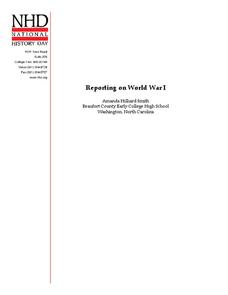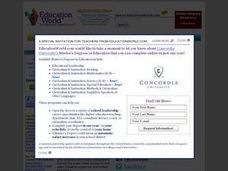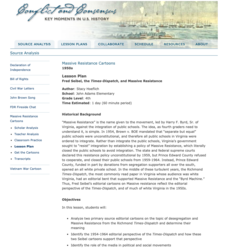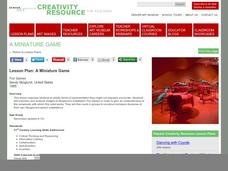National History Day
Reporting on World War I
Throughout history, newspapers have reported the events of the day as they unfolded. Using primary and secondary sources from World War I, scholars uncover how the American people learned of the events of the War to End All Wars. History...
Historical Thinking Matters
Spanish-American War: 1 Day Lesson
After analyzing newspaper articles portraying different perspectives of the explosion of the Battleship USS Maine, your young historians will take a stand on which position is the most believable in both discussion and writing.
NPR
Journalism Lesson Plan
Honor women in journalism with an online exhibit called Women with a Deadline. Class members demonstrate their understanding of the topic in a final assessment by writing a newspaper article on the information they learned in...
Curated OER
Working on the Slant
Compare and contrast a major news story from various newspapers. How does the perspective change? Are certain things included in some of the stories and left out of others? Have pupils complete a graphic organizer to compare how...
Meadows Center for Preventing Educational Risk, University of Texas at Austin
Lesson 9 - Contractions
Is it do'nt or don't? How about doesn't or does'nt? A instructional activity on contractions helps learners identify, form, and use contractions. Components within the plan include direct instruction on decoding and encoding...
Curated OER
Using Prefixes, Suffixes and Root Words to Improve College Level Vocabulary
Grow vocabulary skills with an understanding of affixes and word roots. Included here are a few activities and plenty of materials you can use to support your learners as the focus on building vocabulary.
Museum of the Moving Image
Evaluating Information: Focus on the 2008 Election
Just how true is the information contained in political ads? Determining the veracity of campaign ads from the 2008 presidential race is the focus of a lesson that introduces class members to several fact-checking resources.
Curated OER
Using Graphical Displays to Depict Health Trends in America's Youth
Identify the different types of graphs and when they are used. Learners will research a specific health issue facing teens today. They then develop a survey, collect and analyze data and present their findings in class. This is a...
Curated OER
Newspaper Unit: Reading Lesson Plan
Work on identifying the different parts of a newspaper with your English learners. After reviewing newspaper terminology, pupils pair up and complete a scavenger hunt, looking for specific things in the newspaper and recording their...
Southern Poverty Law Center
Evaluating Online Sources
All sources are pretty much the same, right? If this is how your class views the sources they use for writing or research projects, present them with a media literacy lesson on smart source evaluation. Groups examine several articles,...
Visa
The Influence of Advertising
Pupils become informed consumers and citizens with this lesson on the influence of advertising, identifying basic advertising techniques and discriminating between fact and claim in modern advertisements and commercials.
Roy Rosenzweig Center for History and New Media
Fred Seibel, the Times-Dispatch, and Massive Resistance
A lesson challenges scholars to analyze editorial cartoons created by Fred Seibel, illustrator for the Times-Dispatch, during the Massive Resistance. A class discussion looking at today's editorial pages and Jim Crow Laws leads the...
Curated OER
Lesson Plan: A Miniature Game
Art inspires art, as children work to understand artistic forms that come from the imagination. They analyze the installation piece, Fox Games and then discuss the design process. They then use clay to create imaginative dioramas,...
Curated OER
Shame on You!
Should public humiliation be an acceptable consequence for a crime? Have your middle schoolers engage in a round table discussion about the recent resurgence of the use of public humiliation as a punishment for crimes in the United...
National Park Service
Reduce Our Carbon Footprint, Let’s Compost!
Roll up your sleeves and get a little dirty with this elementary and middle school compost lesson. All you need is a large plastic container, a couple old newspapers, some organic waste, and a few hundred worms and you're ready...
Social Media Toolbox
Social Media Usage
Is there a difference in the way organizations present news via social media and in print? The third in a series of 16 lessons from The Social Media Toolbox explores news outlets and their delivery methods. Groups follow a story for a...
PBS
Facts vs. Opinions vs. Informed Opinions and their Role in Journalism
Do reporters write about what they see, or what they think? Examine the differences between investigative writing and opinion writing with a instructional activity from PBS. Learners look over different examples of each kind of...
National Endowment for the Humanities
Chronicling America: Uncovering a World at War
As part of a study of World War I, class members read newspaper articles from the time that urge American involvement, non-involvement, or neutrality. Using the provided worksheet, groups analyze the articles noting the central argument...
PBS
What Is Newsworthy?
What is news? What is newsworthy? Who decides and what criteria do they use? Introduce young journalists to the basics of reporting with this media literacy lesson.
Curated OER
Paws on Jobland
Students explore various careers in science. In this science and society lesson, the teacher leads a discussion on science careers and duties and responsibilities related to the careers, then students work together to create a mural of...
Curated OER
You've Gotta Have a Gimmick!: A Lesson in Junk Food Advertising
Young scholars examine marketing techniques used in television and magazine snack food ads. They analyze and discuss Internet kids clubs, complete various handouts that examine ads for food, and create a commercial for a food product.
Stanford University
Carlisle Indian Industrial School
How do policies aimed to help actually hurt? Native American boarding schools—an attempt at assimilating children of indigenous tribes into white culture—had a shattering effect on those who attended. With primary sources, including...
Alabama Department of Archives and History
Yellow Journalism
What role did yellow journalism play in bringing the United States into war with Spain? As part of their study of the Spanish-American War, class groups examine newspapers of the times and other texts and then produce their own...
Curated OER
Picture This
A unique writing lesson, this plan begins with learners talking about multiculturalism in small groups. Each learner will choose a picture from a newspaper, describe it to their small group, and think about how it relates to...

























